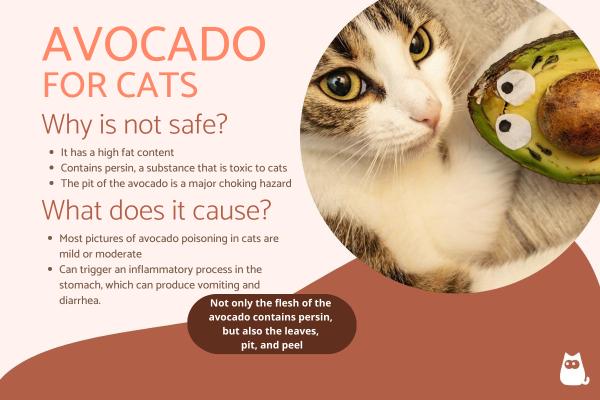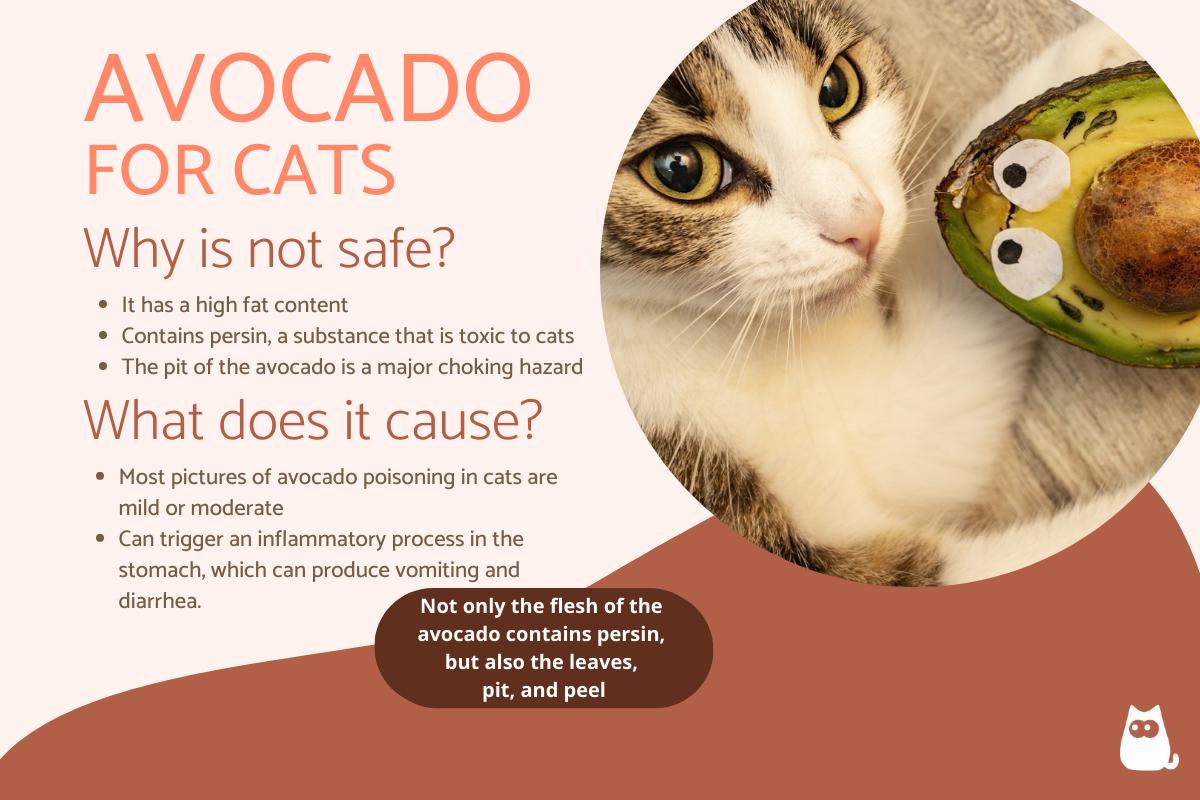Can Cats Eat Avocado?



See files for Cats
Avocados have become a staple in many households around the world. Whether in a salad, on toast or as guacamole, avocados are praised as a healthy, creamy alternative to many fattening foods. Their high monounsaturated fat content and antioxidant properties have made them extremely popular in the health and wellness world. As a result, it's only natural to wonder if our pets will also benefit from their many properties.
The following article from AnimalWised discusses if cats can eat avocados.
Can cats eat avocados?
Although the avocado is a healthy and safe food for humans, there are several species for which the consumption of avocados can be harmful. It is important to know that cats are exclusively carnivores. This means that they do not need to include fruits or vegetables in their diet, as they get most of the nutrients they need from animal protein. In addition, fruits are digested very differently in a cat's carnivorous stomach than in a human's stomach.
Avocados are, in fact, not safe for cats. When a cat eats avocados, the effects are not life-threatening, but they are serious. Cats cannot eat avocado for three reasons:
- High fat content: avocados have a high fat content that can promote the onset of obesity and other related diseases, such as hepatic lipidosis, pancreatitis, diabetes, etc.
- Contains persin: both the fruit and the plant of avocados contain person, a substance that is toxic to cats and other animals.
- Pit is too large: although the probabilities are low, the pit of the avocado is a major choking hazard for both dogs and cats if ingested.
Continue reading this other article to learn more about proper nutrition for cats.
Why is avocado toxic to cats?
Avocado is considered toxic to cats because it contains a toxic substance known as persin. Persin is an antifungal substance found in the leaves, fruit, seed, and peel. The avocado plant naturally produces this substance to protect itself from fungal attack. Although this substance is harmless to humans, it can cause poisoning in our pets. Horses or birds are even more affected by persin, as it has fatal consequences such as heart failure or sudden death.
Therefore, considering the risk that eating this food can bring, it is better to keep it away from our cats. Also, remember that not only the flesh of the avocado contains persin, but also the leaves, pit, and peel. So you should prevent your cat from getting not only the fruit but also the plant.
Although it is not recommended for cats to even taste avocados, fruit in general is a different story. Some fruits are safe for cats in small amounts. However, fruits are generally high in sugar and carbohydrates and should be fed sparingly.
Continue reading this other article to learn which fruits and vegetables are safe for cats.
What happens if my cat eats avocado?
As mentioned before, avocados contain persin, which is toxic in two ways:
- At the cardiac level: in cats that have ingested avocado, there is a pericardial effusion (accumulation of fluid around the heart) with congestion and shortness of breath.
- At the digestive level: it can trigger an inflammatory process in the stomach and intestines, leading to clinical signs such as vomiting and diarrhea.
Most pictures of avocado poisoning in cats are mild or moderate. However, there are also reports of severe poisoning. The effects can vary depending on the amount ingested. If your cat licks an avocado, for example, the amount of toxin ingested is not enough to cause a poisoning pattern.

What to do if your cat eats avocado?
Given the potential risk this food poses to cats, you are probably wondering what to do if your cat accidentally eats avocado. If you suspect or notice that your cat has eaten an avocado or any other part of the plant, you should visit your trusted veterinarian as soon as possible. While it is true that many avocado poisonings in cats present with mild signs, given the possibility of severe poisoning symptoms, it is best to see a veterinarian to assess your cat's health.
If signs of poisoning are detected, treatment must be initiated to avoid the toxic effects of persin. In the most severe cases, detoxification of the digestive tract is performed using different methods. The method chosen will depend on the quantity and the time it has passed since the ingestion of the avocado. These methods include: Induction of vomiting, gastric lavage, or administration of products that prevent absorption of the toxin, such as activated charcoal.
Continue reading this other article to learn more about what to do if your cat has poisoning.
Other foods that cats cannot eat
As we have explained in this article, the avocado plant is toxic to cats. However, the avocado is not the only food that can be harmful to your cat. There are certain foods that cats should steer clear of for a variety of reasons, here are some of them:
- Onions, garlic and leeks: they contain thiosulfate, a compound that can destroy red blood cells and cause anemia.
- Grapes and raisins: in large quantities they can cause kidney problems and severe diarrhea.
- Citrus fruits: like oranges or grapefruits, they cause diarrhea and stomach pain.
- Green tomatoes: contain tomatin, a substance that is toxic to cats. However, as the tomato ripens, the concentration of this toxin decreases.
- Milk: adult cats often develop lactose intolerance, so they should not consume milk. For their part, lactating kittens should only consume milk intended for cats, as milk from other species (such as cow's milk) can cause diarrhea.
- Sausages: their high salt content can have harmful effects on the kidneys.
- Sweet foods: since cats are unable to perceive sweet tastes, consumption of sugar can lead to hyperglycemia and liver failure.
- Raw fish or meat: may contain pathogenic or parasitic microorganisms responsible for various infectious or parasitic diseases. To avoid risks, these foods must always be cooked or otherwise prepared before freezing.
- Chocolate and coffee: contain theobromine, a substance that can cause vomiting, diarrhea and stomach ulcers.
- Alcohol: although it is more than obvious, you should remember that alcohol can cause alcohol poisoning, which can end with the death of the animal.
Continue reading this other article to learn about other fruits and vegetables that are forbidden for cats.
If you want to read similar articles to Can Cats Eat Avocado?, we recommend you visit our Homemade diets category.
- Pet Poison Helpline. Avocado . Available at: https://www.petpoisonhelpline.com/poison/avocado/
- American Society for the Prevention of Cruelty to Animals. Toxic and Non Toxic Plant List.
- Ministry of Agriculture, Fisheries and Food. Avocado, Persea Americana . Available at: https://www.mapa.gob.es/es/ministerio/servicios/informacion/aguacate_tcm30-103002.pdf






